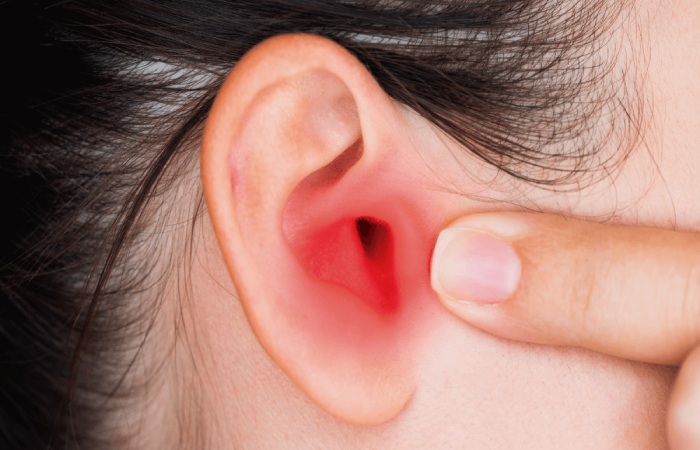Table of Contents
Introduction
Ear Infection Does your child’s ear hurt? It could be an ear infection. Kids are more likely to grow ear infections than adults. Talk to your child’s doctor about the best treatment.
An ear infection is an infection of the ear half, the area behind the eardrum. This infection is called otitis media. This area can become infected when germs from the nose and throat become trapped there. Ear infections occur mainly in young children. They are the most common type of ear infection in children. Most children have at least one middle ear infection before age two. These types of conditions can cause ear pain and fever.
Ear infections are the most common reason parents take their children to the pediatrician. Chronic otitis media can occur without effusion or with effusion (EATS): when children have recurrent episodes of OM (otitis media) or when the middle ear watery stays in the middle ear for a long time.
What Is An Ear Infection?

There are different types of ear infections. An otitis media (acute otitis media) is an infection of the middle ear.
Another condition that affects the middle ear is called exudative otitis media. It occurs when liquid builds up in the middle ear without becoming infected and without causing a fever, earache, or pus collection in the middle ear.
Swimmer’s ear is different from a middle ear infection. It is an infection in the external ear canal.
Causes of Ear Infection
- An otitis media can cause
- Bacteria, such as Streptococcus pneumonia and Herophilus cases of flu (unclassifiable), are the two most common bacterial causes.
- Worms, such as those that cause colds and flu.
Symptoms of Ear Infection
Common symptoms of otitis media in children can include:
- Earache
- fever
- Nervousness or irritability
- Rub or pull on one ear
- Difficult sleep
- When to see a doctor
- Get a doctor right away if your child is younger than three months and has a fever of 100.4 ° F (38 ° C) or higher.
See A Doctor If Your Child:
- Type A fever of 102.2 ° F (39 ° C) before developed
- Pus, discharge, or fluid from the ear
- Symptoms that worsen
- Symptoms of otitis media that last longer than 2 to 3 days.
- Hearing loss
Processing
The doctor will determine the type of illness your child has by asking questions about the symptoms and doing a physical exam. The doctor can diagnose otitis media by looking into your child’s ear to examine the eardrum and see pus in the middle ear.
Antibiotics are often not needed for otitis media because the body’s immune system can fight the infection itself. However, antibiotics such as amoxicillin are sometimes required to treat severe cases or cases that immediately last longer than 2 to 3 days.
Your doctor may recommend waiting vigilantly or delaying prescribing antibiotics in mild otitis media cases.
Watchful waiting: Your child’s doctor may suggest that you watch and wait to see if your child needs antibiotics. It springs the immune system time to fight sour the infection. Strange your child doesn’t feel better after 2-3 days of rest, more fluids, and pain relievers, the doctor may prescribe an antibiotic.
Overdue Prescription: Your child’s doctor may prescribe antibiotics, but they may suggest that you wait 2-3 days before buying them to see if your child is still sick.
What To Do To Feel Better

Here stand some ways to feel better, whether or not antibiotics it required for an ear infection:
Relax.
Drink More Water Or Other Fluids.
Take acetaminophen or ibuprofen for pain or fever relief. Ask your doctor or pharmacist about over-the-counter medicines that help you touch better. Always use over-the-counter medications as directed.
Children and over-the-counter drugs
Use caution when giving over-the-counter medicines to children. Not all over-the-counter drugs are elective for children of certain ages.
Pain Relief Drugs:
Children under six months: only give paracetamol.
Children from 6 months: You can give paracetamol or ibuprofen.
Never give children aspirin as it can cause Reye’s syndrome, a rare but severe condition that damages the liver and brain.
Medicines For Coughs And Colds:
Children below four years of age: Do not habit unless directed by a doctor. Over-the-counter cough and cold medicines in young kids can cause severe and potentially fatal side effects.
Children 4 years and older: Talk to your child’s doctor to determine whether it is safe to temporarily give over-the-counter cough and cold medicines to relieve symptoms.
Be sure to ask your doctor before the pharmacist about the correct dose of over-the-counter drugs for your child’s age and size. Also, tell your child’s doctor and chemist about any prescription or non-prescription drugs your child is taking.
